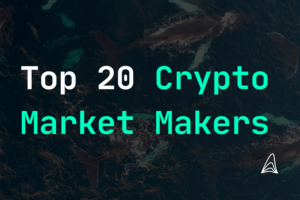
Smart Contract Explained by the Crypto Builders
- Jakob Brezigar
- Last updated: 19.February 2024
- Reading time: 7 min
Imagine if your coffee maker could automatically order its own beans when you’re running low, and even pay for it with digital cash – welcome to a glimpse of the smart contract world, where machines make deals without spilling a drop. A smart contract is essentially a self-executing contract with the terms of the agreement between buyer and seller directly written into lines of code, automating and enforcing contractual obligations without the need for intermediaries.

Table of Contents
What is a smart contract?
A smart contract is a self-executing contract with the terms of the agreement between buyer and seller being directly written into lines of code, which runs on a blockchain.
How do smart contracts differ from traditional contracts?
Unlike traditional contracts, smart contracts automate execution and enforcement without intermediaries, leveraging blockchain for transparency, security, and immutability.
Can smart contracts be used without coding knowledge?
Yes, emerging platforms offer tools to create smart contracts using templates and graphical interfaces, making them accessible to those without coding expertise.
In the digital age, the concept of smart contracts has become a cornerstone of blockchain technology, offering a robust mechanism for executing agreements automatically. A smart contract is essentially a program that runs on the blockchain, executing automatically when predetermined conditions are met, thereby eliminating the need for intermediaries. This transformative technology facilitates secure yet trust-less transactions, ensuring that all parties to a contract can expect a fair outcome without the need for a central authority or middleman.
Key Takeaways
Smart contracts automate agreements with terms directly written into code, eliminating intermediaries and reducing the need for trust between parties.
They operate on blockchain technology, ensuring transparency, security, and immutability of all contractual terms and transactions.
The development and execution of smart contracts require clear terms, measurable conditions, and deployment on a compatible blockchain platform like Ethereum.
Smart contracts have a wide range of applications, from DeFi and supply chain management to digital identity and rights management.
Challenges such as legal enforceability and security vulnerabilities exist, necessitating rigorous testing, audits, and legal compliance checks.
History of Smart Contracts
The history of smart contracts traces back to the early 1990s when American computer scientist Nick Szabo first coined the term, envisioning a world where contract law could be embedded into hardware and software. Although the idea was ahead of its time, the advent of blockchain technology has made Szabo’s vision a reality. Smart contracts have since evolved, becoming a fundamental building block in the development of decentralized applications (dApps).

Technical Foundations of Smart Contracts
Smart contracts are built on the bedrock of blockchain technology, a decentralized ledger that records transactions across a network of computers. This technology ensures that smart contracts are immutable and distributed, meaning once a contract is deployed to the blockchain, it cannot be altered, and its execution is transparent and verifiable by all parties involved.
Blockchains and Smart Contracts
Blockchain technology is not just a platform for cryptocurrencies like Bitcoin; it’s also the foundation for smart contracts. These contracts are stored within a blockchain network, where each block contains a transaction or piece of data, including the smart contract’s code. This setup ensures that the contract executes automatically based on the contract’s terms, without any possibility of downtime, censorship, fraud, or third-party interference.

How Smart Contracts Work, Step by Step
Smart contracts revolutionize how agreements are formed, executed, and enforced, leveraging blockchain technology to automate processes that traditionally require manual oversight. Here’s a step-by-step guide to understanding how smart contracts work:
Step 1: Identify Parties and Establish the Terms of the Agreement
The first step in creating a smart contract is to identify the parties involved and establish the terms of the agreement. This involves defining the obligations, benefits, and penalties in clear terms. Just like in traditional contracts, all parties must agree on the terms before the contract can proceed to the next step.
Step 2: Define the Conditions for Contract Execution
Once the terms are established, the next step is to define the specific conditions under which the contract will automatically execute. These conditions are if-then statements (e.g., “if product is delivered, then payment is released”) that are coded into the smart contract. The conditions must be measurable and observable, ensuring that the contract can execute automatically without ambiguity.
Step 3: Record the Contract's Details on the Blockchain Ledger
After defining the terms and conditions, the smart contract’s details are recorded on a blockchain ledger. This step involves coding the contract into the blockchain, making it immutable and transparent. The blockchain records all transactions and contract states, ensuring that the information is secure and tamper-proof. This transparency and security are what distinguish smart contracts from traditional contract mechanisms.
Step 4: Deploy the Contract to a Blockchain Platform
The final step is deploying the smart contract to a blockchain platform, such as Ethereum, which supports smart contract functionality. Once deployed, the smart contract resides on the blockchain, where it can interact with other contracts and execute automatically when its conditions are met. The deployment marks the contract as active, ready to execute based on the predefined conditions without any need for further human intervention.
This step-by-step process ensures that smart contracts operate in a decentralized, secure, and efficient manner, automating traditional contracts’ execution and enforcement. By leveraging blockchain technology, smart contracts provide a powerful tool for creating trustworthy, automated agreements that can execute without the need for intermediaries.
How Are Smart Contracts Executed?
A smart contract executes when predetermined conditions, coded into the contract, are met. This process is automated, reducing the need for traditional legal contracts and streamlining complex transactions. The smart contract’s execution is supported by the underlying blockchain network, ensuring that all smart contracts work as intended, facilitating a wide range of applications from financial agreements to automated supply chain management. However the smart contract’s terms have to be met in order for it to work appropriately.
Smart Contract Applications and Use Cases

The applications of smart contracts are vast and varied, impacting numerous industries by providing secure, automated solutions for contracts and agreements. Some of the smart contract use cases are:
Decentralized Autonomous Organizations
Decentralized Autonomous Organizations (DAOs) leverage smart contracts to operate without centralized leadership, automating decision-making and operational processes. This innovative use case demonstrates the potential of smart contracts to facilitate autonomous, transparent organizational structures.
Decentralized Finance (DeFi) Applications
DeFi represents a major leap in the finance sector, utilizing smart contracts to create permissionless financial systems. From lending and borrowing platforms to automated market makers, DeFi applications showcase the versatility and efficiency of smart contracts in creating complex financial instruments without the need for traditional financial intermediaries.
Rights Management (Tokens)
In the realm of digital assets, smart contracts are instrumental in creating and managing tokens that represent rights to real-world or digital assets. This capability has paved the way for innovative approaches to property ownership and asset management, including the emergence of non-fungible tokens (NFTs).
Conversion of Assets into Non-Fungible Tokens (NFTs)
The conversion of digital and physical assets into NFTs underscores the transformative power of smart contracts. By ensuring the uniqueness and ownership of digital assets, smart contracts are at the heart of the non-fungible token revolution, changing how we think about ownership and value in the digital age.
Digital Identity
Smart contracts offer a secure and efficient means of managing digital identities, allowing individuals to control their personal information and how it is shared. This application has significant implications for privacy and data protection in the digital world.
Financial Products (DeFi)
Smart contracts enable the creation of sophisticated financial products within the DeFi ecosystem, including derivatives, stablecoins, and insurance protocols. These products demonstrate the capability of smart contracts to automate and secure financial transactions in a decentralized context.
Supply Chain
In supply chain management, smart contracts provide a transparent and immutable record of transactions, ensuring the integrity of the supply chain from production to delivery. This application highlights the potential of smart contracts to revolutionize global trade by automating and securing supply chain operations.
Healthcare Data Management
The healthcare industry benefits from smart contracts through secure and efficient management of patient data, automating consent and access controls to ensure privacy and compliance with regulatory standards.
B2B Data Marketplaces
Some of the other Smart contracts facilitate secure and automated exchanges of data between businesses, enhancing efficiency and reducing the risk of data breaches in B2B transactions.
Royalty Payment in Media and Entertainment
Automated royalty payments, enabled by smart contracts, ensure that creators are compensated fairly and promptly for the use of their work, revolutionizing the media and entertainment industry by providing transparency and efficiency in royalty distribution.
Smart Contract Development
The development of smart contracts requires a combination of technical skills and an understanding of the legal and operational frameworks within which they operate. Mostly the tasks are performed by the smart contract developers with sufficient skillset.

Write the Smart Contract Code
Developing a smart contract’s code demands proficiency in programming languages such as Solidity for Ethereum-based contracts. This process involves coding the rules and conditions under which the contract operates, ensuring that the smart contract executes as intended. Programming language to make a simple smart contract can vary, based on the programme’s skills or preferences.
Can Smart Contracts Be Created Without Coding?
Emerging platforms and tools now offer ways to create smart contracts without deep coding knowledge, making the technology more accessible to a wider audience. These platforms provide templates and graphical interfaces that simplify the process of smart contract development, opening up the field to non-developers.
How Do I Start Learning Smart Contract Development?
For those interested in smart contract development, the journey begins with a solid understanding of blockchain technology. Following this, aspiring developers should learn specific smart contract programming languages, such as Solidity or Vyper, to write the smart contract code effectively. Resources for learning include online courses, tutorials, and community forums, which provide a comprehensive foundation for becoming proficient in smart contract development.
Smart Contract Benefits and Challenges
While smart contracts offer significant advantages for all blockchain parties not only the crypto market makers, they also face challenges that need to be addressed to realize their full potential.
Smart Contract Benefits
The automation, transparency, and smart contract security have the potential to reduce transaction costs and times significantly, enhance trust among parties, and open up new possibilities for digital transactions. These benefits highlight the transformative impact of smart contracts on various sectors, from finance to healthcare.

Challenges of Smart Contracts
Security Issues
Security is a paramount concern in the world of smart contracts. The immutable nature of blockchain means that once a smart contract is deployed, its code cannot be altered, making it crucial to ensure the security of the smart contract’s code before deployment. Vulnerabilities in the code can be exploited, leading to potential losses, underscoring the importance of rigorous testing and audits.
Enforceability of Smart Contracts
The legal enforceability of smart contracts poses a significant challenge, as the legal framework surrounding digital contracts is still evolving. For a smart contract to be considered a legal contract, it must fulfill traditional legal criteria, including mutual consent and a clear offer and acceptance. The distinction between smart legal contracts and traditional legal contracts is crucial, as the former seeks to embed legal agreements within the code of smart contracts, thereby making them legally enforceable in a court of law. However, the global legal system’s recognition of smart contracts varies, making it essential for parties involved to understand the legal implications of their contract execution.
Difference from Smart Legal Contracts
Understanding the difference between smart contracts and smart legal contracts is vital. While smart contracts automate the execution of agreements based on predefined rules, smart legal contracts aim to integrate these automated agreements within the legal framework, ensuring they are recognized and enforceable by law. This integration poses challenges, particularly in aligning the deterministic nature of smart contracts with the often nuanced and interpretive nature of legal agreements.
Best Practices and Future Directions
Best Practices for Using Smart Contracts
Adhering to best practices is essential for maximizing the benefits of smart contracts while mitigating risks. This includes conducting thorough rigorous testing and security audits to identify and rectify vulnerabilities in the smart contract code before deployment. Additionally, engaging with legal experts to ensure that smart contracts comply with relevant laws and regulations is crucial. Developers and users should also stay informed about advancements in smart contract development and blockchain technology to leverage the full potential of smart contracts. Smart contract implementation is future of the contract making, which should not be neglected by anybody.

Benefits of Smart Contracts
The continued refinement and adoption of smart contracts promise to streamline processes across industries, offering a glimpse into a more efficient, decentralized future. The benefits of smart contracts extend beyond automation, providing a transparent, secure, and cost-effective means of executing agreements. As blockchain technology matures and smart contract development practices improve, the potential for smart contracts to transform industries becomes increasingly evident.

Smart Contract Explained - Summary
Smart contracts represent a significant leap forward in automating and securing digital agreements. From revolutionizing supply chain management to enabling innovative financial products through Decentralized Finance (DeFi), smart contracts are reshaping how transactions and agreements are executed across various sectors. However, challenges such as security vulnerabilities and legal enforceability must be addressed to fully realize the potential of smart contracts.
By adhering to best practices in smart contract development and staying abreast of legal and technological advancements, the future of smart contracts is poised for substantial growth, further integrating digital contracts into our digital and economic landscapes. As we continue to explore and expand the applications and capabilities of smart contracts, their role in facilitating secure, transparent, and efficient transactions will undoubtedly continue to grow, marking a transformative period in the evolution of digital agreements and blockchain technology. All in all it is a good decision to engage with parties that support smart contracts, as they showcase transparency well.
Disclaimer: The information provided in this article is for informational purposes only and does not constitute financial, investment, or other professional advice. All opinions expressed herein are solely those of the author and do not represent the views or opinions of any entity with which the author may be associated. Investing in financial markets involves risk, including the potential loss of principal. Readers should perform their own research and consult with a licensed financial advisor before making any investment decisions. Past performance is not indicative of future results.

Jakob Brezigar
Jakob, an experienced specialist in the field of cryptocurrency market making, boasts an extensive international presence. With Orcabay, he has skillfully managed major operations and deals for a wide array of global stakeholders.



